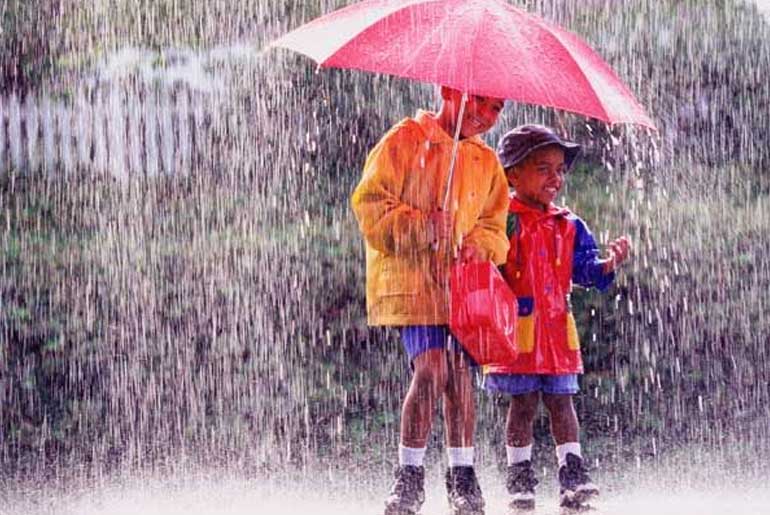Monsoon season introduces high moisture levels in the air, leading to an increase in harmful suspended particles that can adversely affect children’s health. The risk of illness rises, making it crucial to implement precautions to protect kids. Dirty rainwater and puddles serve as breeding grounds for harmful germs, including bacteria, viruses, and insects, which children may encounter while playing outdoors, resulting in infections. Additionally, heavy rains can contaminate drinking water with germs, heightening the risk of gastrointestinal infections. Ensuring clean environments and safe drinking water is essential for maintaining children’s health during this season.
Fluctuations in temperature and exposure to cold, damp air during the monsoon season can be particularly harmful to children, leading to infections of the nose and throat. These conditions also contribute to allergic respiratory disorders, causing obstruction of the breathing passages. It is crucial to take preventive measures to safeguard children’s respiratory health during such periods to minimize the risk of these infections and allergic reactions.
Risk of developing the following diseases:
- Gastrointestinal diseases:
Gastrointestinal diseases during the monsoon season can arise from several factors, including the consumption of street food prepared in open or unclean environments, which increases the risk of contamination. Ingesting food and liquids exposed to harmful germs can lead to symptoms such as diarrhea, abdominal pain, bloating, and vomiting. Food poisoning is particularly common, making it essential to follow adequate precautions, such as ensuring food hygiene and avoiding consumption of potentially contaminated food and water, to safeguard health during this season.
2. Respiratory infection:
Sudden temperature changes during the monsoon season can facilitate the spread of respiratory germs and weaken children’s immune systems, increasing their susceptibility to respiratory infections. Heavy rains can exacerbate air pollution, posing additional risks to children. Inhaling polluted air can lead to various respiratory issues such as cough, sore throat, sneezing, wheezing, and colds. It is crucial to take preventive measures to protect children from these respiratory challenges during the monsoon season.
3. Dengue and malaria:
Water stored in open containers or buckets for household purposes can become breeding grounds for dangerous mosquitoes like Aedes and Anopheles, which are vectors of dengue and malaria, respectively. These mosquitoes thrive in stagnant water found in puddles, flowerpots, and containers. Children bitten by these mosquitoes can experience symptoms such as fever, excessive sweating, chills, fatigue, pain behind the eyes, and skin irritation and rashes. It is important to take precautions to eliminate stagnant water and protect children from mosquito bites to prevent these diseases.
Preventive Measures for Children’s Health
- Avoid Wading Through Rainwater: Children should be advised not to wade through rainwater to prevent exposure to contaminated water, which can lead to various infections and diseases.
- Keep Surroundings Clean: Ensure no stagnant water around the house in pots, tires, drums, or other containers to reduce the risk of mosquito breeding, which can lead to dengue and malaria.
- Wear Protective Clothing: Encourage children to wear full-sleeved shirts and pants to cover their bodies and reduce the risk of mosquito bites.
- Avoid Street Food: Discourage consumption of street or junk food prepared in outdoor spaces prone to contamination. Opt for healthy, home-cooked meals to minimize the risk of gastrointestinal diseases.
- Balanced Diet: Parents should provide a well-balanced diet rich in fruits, vegetables, and other nutrients to boost the child’s immunity and overall health.
- Shower After Outdoor Activities: Children should take a shower after being outdoors, especially during heavy rainfall, to wash off any germs they might have come in contact with.
- Seek Medical Attention: Avoid self-medicating for fever and cold. Consult a doctor promptly to ensure proper diagnosis and treatment, preventing the worsening of symptoms.
- Practice Good Hygiene: Teach children to avoid touching or rubbing their eyes with dirty hands to prevent eye infections. Encourage regular hand washing with soap and water.
Adopting these preventive measures can significantly reduce the risk of infections and diseases in children. Maintaining cleanliness, encouraging good hygiene practices, providing nutritious meals, and seeking timely medical advice are essential steps in ensuring children’s health and well-being.
Disclaimer:
The information contained in this article is for educational and informational purposes only and is not intended as a health advice. We would ask you to consult a qualified professional or medical expert to gain additional knowledge before you choose to consume any product or perform any exercise.








